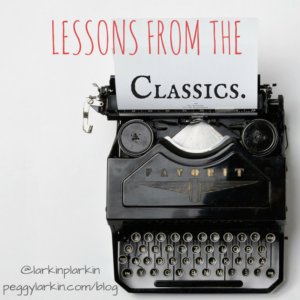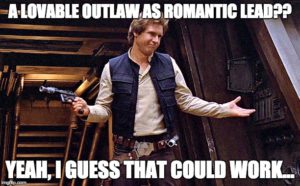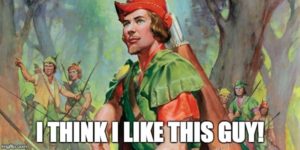 Note: This is part of an ongoing series of posts that take what I’m teaching in my 11th-grade American Lit classes and then shows how that could translate into creative writing, using examples of what I’m doing. I welcome feedback, because I’m no expert on American literature–just somebody who’s been teaching it for a couple of years. I would also love to hear how other writers are using these tools!
Note: This is part of an ongoing series of posts that take what I’m teaching in my 11th-grade American Lit classes and then shows how that could translate into creative writing, using examples of what I’m doing. I welcome feedback, because I’m no expert on American literature–just somebody who’s been teaching it for a couple of years. I would also love to hear how other writers are using these tools!
This week in American lit, students are working in small groups to read Bret Harte’s* short story “The Outcasts of Poker Flat” (1892). This is our first example of literary naturalism, or a story that presents as its theme a bleak worldview in which individuals are crushed and destroyed by an unfeeling world/social order (or, as I tell the students, “if everybody’s dead at the end and nobody cares and nothing changes about the world, it’s probably naturalism”).
The plot of “Outcasts” finds four ne’er-do-wells from the town of Poker Flat escorted out of town: John Oakhurst, gambler; Mother Shipton, who runs a brothel; The Duchess, an employee of Mother Shipton’s; and Uncle Billy, a drunk and a suspected thief. This being naturalism, they all end up dead in the wilderness, but Harte’s focus on their actions between their expulsion from civilized society reveals that “in the end…these seeming derelicts really had hearts of gold” (VanSpanckeren 5). Well… most of them, anyway–Uncle Billy definitely takes the mule and horse and leaves the rest of them to die.
But Oakhurst offers his horse to the Duchess, whose mule isn’t capable of carrying her; Mother Shipton starves herself to give extra food to the innocent Piney, who was running to Poker Flat to marry her sweetheart, Tom; and Piney and the Duchess die huddled together for warmth, equal in death:
And when pitying fingers brushed the snow from their wan faces, you could scarcely have told from the equal peace that dwelt upon them, which was she that had sinned. Even the law of Poker Flat recognized this, and turned away, leaving them still locked in each other’s arms. (Harte 33)
The story ends with Oakhurst writing his own epitaph on a playing card (“who struck a streak of bad luck…and handed in his checks”) and nailing it to a tree–“And pulseless and cold, with a Derringer by his side and a bullet in his heart, though still calm as in life, beneath the snow lay he who was at once the strongest and yet the weakest of the outcasts of Poker Flat” (Harte 35). As I made several students explain to me, Oakhurst is physically strong, and stays calm, and cares for others–the strongest–but gives up and kills himself–the weakest.
That juxtaposition–the innocent and the sinner, the strongest and the weakest–is, to my mind, what gives this story its punch; and let’s not pretend we don’t all love a noble thief or a charming rogue, right?

One of my WIPs features a romantic-hero-mafioso, and the other a band of rebels desperate to bring down an empire. These things have, like everything, been done before, but I think I can get some good hints from Harte about how to use juxtaposition to create interesting characters, and to do it using indirect characterization.
Oakhurst is strong–a classic John Wayne Romantic hero, the guy who’s better than the system he’s trapped in, using his strength to protect others according to his own code of ethics, even when society says he shouldn’t. He’s introduced as a gambler (so, definitely a Bad Guy, barely one step above a thief), but right away the narrator shows us that Oakhurst is sensitive and that he has a “calm, handsome face” that “betrayed small concern” when he realizes that “I reckon they’re after somebody… Likely it’s me'” (2). And early on the narrator tells us that “it was only in… easily established standards of evil that Poker Flat ventured to sit in judgement” (3). Oakhurst is presented as being better than the reactionary judges that boot him from town: “He was too much of a gambler not to accept Fate” (5). Later, everyone else is upset, but he stays cool, with “easy good-humor” (7).  He tries to keep the outcasts together; he gives the Duchess his horse, leads the making of camp, and tries to protect the others from Uncle Billy’s betrayal. Oakhurst won all of Tom’s money in a card game, then gave it back, warning Tom against gambling (“‘Don’t try it again'” (11)). He sends Tom for help, saving The Innocent (Tom’s nickname–very subtle) yet again. He’s competent, and he wants to protect the weak and innocent–even though he’ll happily live by gambling and taking money from the rich.
He tries to keep the outcasts together; he gives the Duchess his horse, leads the making of camp, and tries to protect the others from Uncle Billy’s betrayal. Oakhurst won all of Tom’s money in a card game, then gave it back, warning Tom against gambling (“‘Don’t try it again'” (11)). He sends Tom for help, saving The Innocent (Tom’s nickname–very subtle) yet again. He’s competent, and he wants to protect the weak and innocent–even though he’ll happily live by gambling and taking money from the rich.
The strength of Harte’s characterization is in the fact that it’s indirect and based on action–emotion lives in the body, and actions speak louder than words–and in the fact that the actions are often unexpected. A gambler giving up his horse to a prostitute? Sure, a gentleman would give his horse to a lady–but society has literally just rejected both of these characters; Oakhurst still gives up the horse. A father would give good advice to his son; Oakhurst gives fatherly advice (and money) to The Innocent of Sandy Bar.
I suppose that’s Harte’s way of having him Save The Cat – have him do something good so that you know he’s a good guy, even though he’s just been cast out of town for immorality.
In my RSWIP, the hero’s in the mob. Like, nephew to the Don. So it’s important to me to establish early on that he’s no Sonny Corelone. He’s not even Michael. He’s not even Fredo! So his first scene involves some chances to save some cats:
- he sees that the new hostess at the restaurant he manages is young and pretty, and thinks he’ll need to keep an eye on his uncles/cousins when she’s on duty
- he’s just come from his uncle’s funeral, and is upset about losing his uncle but also about the fact that it puts in jeopardy their agreement to let him buy the restaurant and take it legit
- he’s unexpected confronted by the heroine, someone who’s on his family’s official hit list, and tells her he won’t kill her–even though her testimony put his mother in jail for life, and mom’s been encouraging him to go find and kill the heroine ever since (so, for like fifteen years?)
Yeah, that third one’s the big one, but I’m hoping that building up to it makes it believable–my goal is to establish that he’s a good guy, despite the fact that he’s also, well… you know. A bad guy.
So, like Harte does with Oakhurst, I want to make sure he’s got some gentlemanly traits–protective of others, calm and fair-minded–to contrast against his (involuntary) affiliation.
Don’t worry, though. I’m not planning to take this story in the direction of Naturalism. Most of the characters won’t be dead at the end.
Most.
*No, not that Bret Hart.
WORKS CITED:
Harte, Bret. “The Outcasts of Poker Flat.” The Luck of Roaring Camp, The Outcasts of Poker Flat & The Idyl of Red Gulch. Vol. X, Part 4. Harvard Classics Shelf of Fiction. Bartleby.com, n.d. Web. 17 Jan. 2017. <http://www.bartleby.com/310/4/2.html>.
VanSpanckeren, Kathryn. Outline of American Literature. Chapter 5: “The Rise of Realism: 1860-1914.” Washington, D.C.: U.S. Department of State, 27 July 2011. <http://iipdigital.usembassy.gov/st/english/publication/2011/07/20110727110855su0.6739575.html> (17 January 2017).